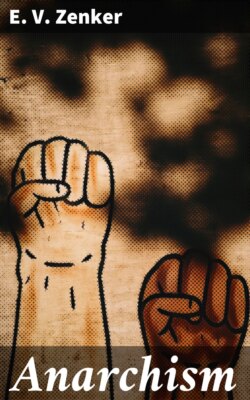Anarchism

Реклама. ООО «ЛитРес», ИНН: 7719571260.
Оглавление
E. V. Zenker. Anarchism
Anarchism
Table of Contents
PREFACE
PART I
EARLY ANARCHISM
CHAPTER I
PRECURSORS AND EARLY HISTORY
CHAPTER II
PIERRE JOSEPH PROUDHON
CHAPTER III
MAX STIRNER AND THE GERMAN FOLLOWERS OF PROUDHON
PART II
MODERN ANARCHISM
CHAPTER IV
RUSSIAN INFLUENCES
CHAPTER V
PETER KROPOTKIN AND HIS SCHOOL
CHAPTER VI
GERMANY, ENGLAND, AND AMERICA
PART III
THE RELATION OF ANARCHISM TO SCIENCE AND POLITICS
CHAPTER VII
ANARCHISM AND SOCIOLOGY: HERBERT SPENCER
CHAPTER VIII
THE SPREAD OF ANARCHISM IN EUROPE
CHAPTER IX
CONCLUDING REMARKS
Footnote
SOUND MONEY
G. P. PUTNAM'S SONS. NEW YORK AND LONDON. INTERNATIONAL RELATIONS
G. P. PUTNAM'S SONS, New York and London
Отрывок из книги
E. V. Zenker
A Criticism and History of the Anarchist Theory
.....
If we look more closely into the doctrine of the so-called contrat social, which was destined to form the programme of the French Revolution, we again recognise without much difficulty the fundamental ideas of the Millennialists, hardly altered at all. A Paradise without laws, existing before civilisation, which is considered as a curse, and another like unto it, when "this cursed civilisation" is abolished, is what a modern Anarchist would say. The names only are different, and are taken from the vocabulary of Rationalism, instead of from that of religious mythology. Instead of divine rights men spoke now of the everlasting and unalterable rights of man; instead of Paradise, of a happy state of nature, in which there is, however, an exact resemblance to Ovid's golden age, the transition into the present form of society was represented to be due to a social contract or agreement, occasioned, however, by a certain moral degeneracy in mankind, only differing in name from the "Fall." In this case, also, Anarchy is regarded as underlying society as the ideal state of nature; every form of society is only the consequence of the degeneration of mankind, a pis aller, or, at any rate, only a voluntary renunciation of the original, inalienable, and unalterable rights of man and nature, the chief of which is Freedom.
In the further development of this main idea the believers in the contrat social have been divided. While some, foremost among whom is Hobbes, declared the contract thus formed once and for all as permanent and unbreakable, and hence that the authority of the sovereign was irrevocable and without appeal, and thus arrived at Monarchism pure and simple; others, and these the great majority, regarded the contract merely as provisional, and the powers of the sovereign as therefore limited. In this case everyone is not only free to annul the contract at any time and place himself outside the limits of society,[9] but the contract is also regarded as broken if the sovereign—whether a person or a body corporate—oversteps his authority. Here the return to the primeval state of Anarchy not only shines, as it were, afar off as a future ideal, but appears as the permanently normal state of mankind, only occasionally disturbed by some transitory form of social life. This idea cannot be more clearly expressed than in the words which the poet Schiller—certainly not an advocate of bombs—puts into the mouth of Stauffacher in William Tell:
.....